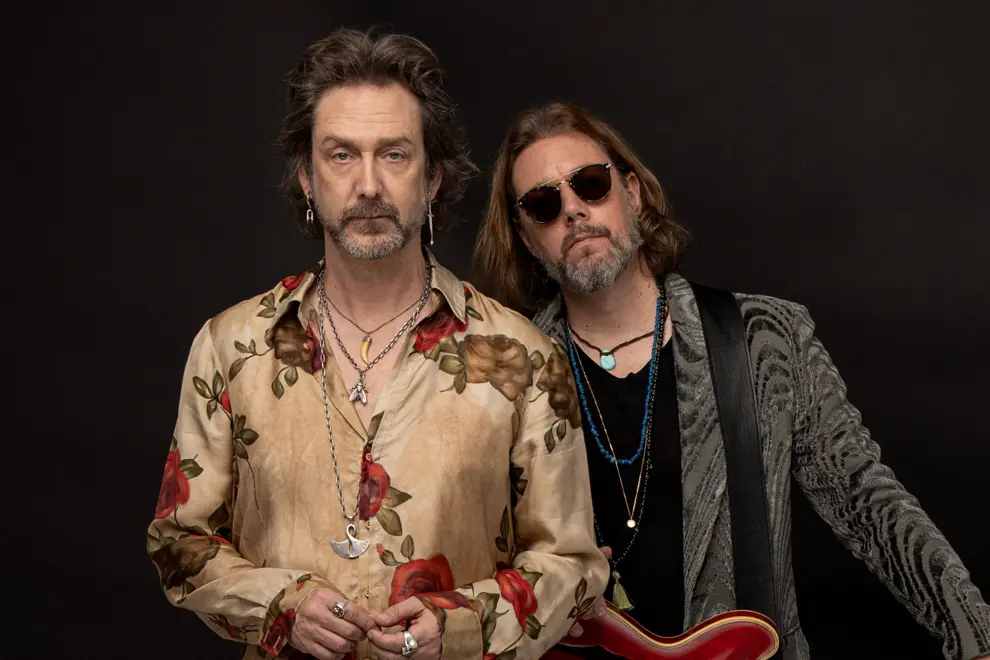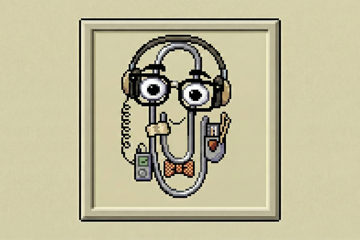 The Black Crowes
The Black CrowesThe record begins in what is now, after four decades, signature style – a searing, electric slide riff, equal parts R&B and rock ‘n’ roll, the rumbling vocal over the top instantly recognisable to those in the know. The song is Bedside Manners, and it kicks off Happiness Bastards, the first album of new material from The Black Crowes in 15 years.
A decade and a half is one hell of a long time between drinks, particularly when placed within the context of a 40-year career (the band’s eight other studio records were released over a 19-year period), but then, The Black Crowes have never followed any one prescribed path, the well-documented waxing and waning tensions between founding brothers Rich and Chris Robinson seeing the band wax and wane itself.
When the band split for the third time in 2015, then, many would have anticipated an eventual reunion – given it’s what the band had done twice previously – but there were never any guarantees. It took, as Rich Robinson says, a coincidence and that crafty old devil, fate, to bring the pair back together in order to release an album they never knew would exist.
“The way we got back together was very synchronistic,” Robinson muses. “One of the songs on the record, Wanting & Waiting, was the first song I had for the record, and it was from before I even knew we were going to get back together, I just had this song.
Don't miss a beat with our FREE daily newsletter
“I mentioned it to a mutual friend that Chris and I know, and I said that I’d love to hear Chris sing on this song, because it’s really suited to him. And [this guy] said, ‘Chris said [a similar] thing to me, like, two days ago’ – I was like, ‘That’s cool,’ but you move on... Then I was in New York, and he was in New York, and so we talked and... It flowed, there was nothing forced, there was no agenda, and I know it may sound sappy or weird, but the universe kinda brought us back together in a very gentle way.”
This was in 2019, and the band essentially picked up where it left off: they toured extensively for the 30th anniversary of debut Shake Your Money Maker (1990), ground to a halt with the rest of the world through the pandemic, went back out on tour releasing a live record and an EP of covers, writing all the while, and it was from this ‘gentle’ way of being, that the band built itself back up. “[It was] really cool, really positive, really mellow,” Robinson says of the time. And it was from this time then, that Happiness Bastards grew.
And it grew slowly, organically, without agenda or stipulation, helped in large part by the time the pair had to themselves while the pandemic raged, unchecked, about us all. “[When the pandemic happened], it was like someone just plopped down a year and a half on your lap, and you’re like, ‘Oh shit! The world just shut down, that’s weird.’ So the writing wasn’t for any purpose, which is what I like about it,” Robinson says.
“It was like, fuck, OK, we have a year and a half, I’m just gonna start writing and sending stuff, Chris was like, ‘Yeah, just do it.’
“So there was no stress, there was no deadline, I had a studio in my house with all the instruments so I just built all these demos and I’d send them to Chris to sing on, and it was just a really cool thing. And everything was done with that same sense – nothing was off the table... I was just doing what I do, I’m not trying to write this kind of song or that kind of song, they just kinda come and they dictate where the record is gonna go. So the core of the record came from that spirit, you know?”
The resulting Happiness Bastards is a quintessential Black Crowes record – a multi-limbed rock ‘n’ roll beast quite obviously informed by the blues and the grooves that permeated through that ancient genre, equally at home chugging along or reigning things back in, introspective and pithy. It is, as Robinson is quick to point out, a very cohesive unit, despite the peaks and troughs that define the album’s ten tracks. “Chris and I have always had ideas and concepts as to what kind of record we make,” he explains.
“Southern Harmony (1992) was a live record, we went in and made it in eight days, done, a lot of those songs were one take. Amorica (1994) was different; we wanted to make a studio album, a studio sounding record. But the interesting thing is, there’s always been... a journey on all of these records, but they always did maintain, whether they were commercial or not, there always was a cohesion, because all these things filtered through Chris and I.
“So by the time we got to this record, there are elements of Shake Your Money Maker and Southern Harmony on this record, there is a cohesion to it. There’s still a journey, there’s still a trip you take, like from Bedside Manners, you go to a song like Bleed It Dry, or Follow The Moon, and then there’s a punk rock kinda song in Flesh Wound, and then you have this, [and that] and all these things, but it is a Black Crowes record – ultimately, that’s what it is, man, there’s a thread that runs through the whole thing and that’s what makes it that.”
In the accompanying press material for the album, Chris Robinson opines that Happiness Bastards is the band’s love letter to rock ‘n’ roll, something brother Rich agrees with emphatically, adding that for him, the record is one that exudes passion, like after fifteen years, he’s fallen in love with making Black Crowes music once more. “[Oh yeah], one of the feelings I get from this record is that there’s a passion behind it, there’s rock ‘n’ roll behind it,” he smiles.
“I loved Chris’s explanation that it’s a love letter to rock ‘n’ roll music, and it really kind of is,” he goes on. “Rock ‘n’ roll to me is and has always been the broadest of genres, you know – in the day, you had the [Rolling] Stones and [Led] Zeppelin, but Joni Mitchell was rock ‘n’ roll, so was Neil Young and Bob Dylan and Sly Stone and Joe Cocker. Bob Marley was rock ‘n’ roll and everyone kinda fit under this massive umbrella and there was a uniqueness to everyone, and the uniqueness was celebrated, instead of stamped out.”
Robinson goes on to bemoan the state of rock ‘n’ roll today as he sees it – “Man, I can’t even tell who the fuck is singing, there’s no uniqueness anymore” – which he cuts short with a self-conscious laugh before returning to the business at hand: rock ‘n’ roll as the Crowes are creating today.
In the creation of this particular piece of rock ‘n’ roll, there were more hands involved than just the brothers Robinson. The pair reunited with long-time bassist Sven Pipien, who features prominently on the album, as well as joining forces with renowned producer Jay Joyce, whose resume reads like the proverbial ‘Artists Anyone Would Like To Be Stranded On A Desert Island With’ – Patty Griffin, John Hiatt, Emmylou Harris, The Wallflowers, Amos Lee, Keith Urban, Zac Brown Band, Eric Church, you name it (he’s also played guitar for Iggy Pop, Crowded House, John Hiatt and Macy Gray, among others).
Both brothers are more than adept at working on the other side of the desk, having produced numerous other bands over the years along with their own side-projects, as well as having a hand in the production of many of The Black Crowes’ previous albums, but as Robinson explains, in this instance they were keen on having someone a bit further removed from the project than they were.
“Yeah, we knew enough to be like, we thought we should have someone come in and have, not a dispassionate view, but a 10,000 foot view without any baggage,” he reasons. “Someone who can come in and look at what we’re doing and be like, ‘OK.’ So we made a decision, we need someone to come in and do this, so we were cool with it. And the minute we talked to Jay, I was like, ‘I like this guy.’ And Chris and I agreed instantly on his energy, on his vibe, what he was talking about, just a really cool dude, and that was it.”
Where Joyce was invaluable to the band then, was in that 10,000 foot view – it’s worth mentioning again how long Rich and Chris Robinson had been working on these songs, and it’s a fair assumption to make that, when it came time to head into the studio, they’d have been having trouble seeing the wood from the trees, a common affliction affecting anyone involved in a creative endeavour.
A prime example was the song Cross Your Fingers, which begins with a slow and melodic acoustic guitar with Chris Robinson’s vocal riding rough over the top, before breaking down into a heavy, slow-nodding stoner rock-esque electric riff. “Yeah, when I wrote that, [it was all fine] and the chorus was the same but it wasn’t lifting,” Robinson says.
“And so a producer like Jay can come in and say, ‘Well how about instead of trying to push it forward, we pull it back?’ And it lifted. And he did it in a way that I wouldn’t have thought of because that chorus kinda mellows and does this other thing, and I was like, ‘Wow, that’s fucking cool...’ So just those little things. And he knew when to push us, and when to not. And that is the hallmark of a great producer.”
Another who was involved in Happiness Bastards was multi-CMA- and Grammy-winning country artist Lainey Wilson, contributing vocals to the track Wilted Rose, one of the slower songs on the record and one which almost defies sonic description, crossing as it does seemingly multiple genres lines, all while retaining exactly the vibe required for its particular place within the track listing.
Wilson, who since recording her vocals for Wilted Rose won Best Country Album at the 2024 Grammy Awards for her fourth record, Bell Bottom Country, came to be involved through the band’s connection with Darius Rucker, whose old band Hootie & The Blowfish they’d toured with before, prior to Rucker striking out solo and “going country”, as Robinson says with a laugh. “Darius would sing She Talks To Angels (from Shake You Money Maker) every night during his set,” Robinson says. “He loved the song, he grew up loving the song. And he was like, ‘[Come and sing it with me] at the CMT Awards or something,’ and so we went and did it.”
“We’d never been to a country music awards, we never really crossed with the country world, we just did our own thing – but the outpouring of love for the song and for the band, it was a really amazing thing. And Lainey was there, and we met her and she was a sweetheart and her voice is so authentic and amazing, and we were like, ‘This would be really cool for this song; it seems like her voice would really fit.’ The vibe of the whole thing.
“So we knew Jay had worked with her, he spoke really highly of her, and so we made it happen.”
The result sits like an oasis in the midst of Happiness Bastards’ otherwise ripping vibe, a well-placed piece of introspection on an album that fair throbs with energy, with passion, with rock ‘n’ roll and the love for same. It is, as Robinson sums up, a record which shows no fear, which given it’s been a decade and a half coming, is no mean feat. “We have had a tumultuous relationship throughout the years, but for whatever reason, when Chris and I would get into a room to write, we left all that bullshit behind,” he muses.
“And that’s why there was no fear involved; the one thing we both understood or knew or had so much respect for that we never fucked with it is, when we get into a room to write, we both have enough respect for each other and each other’s abilities, not to fuck around. “
“And so there were way more other things we would fight about and be stupid about,” he finishes with a laugh, “but writing songs we took very seriously. So there’s never been any fear in that sense. There’s something very free about it all. So I do think that added to the overall vibe of the record, you know what I mean?”
Happiness Bastards is out March 15 via Silver Arrow Records.

















